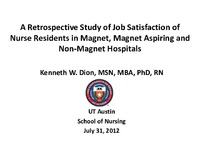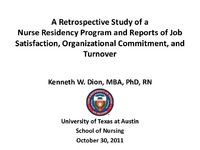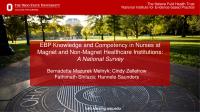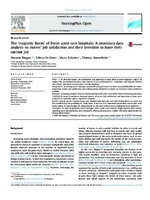| dc.contributor.author | Dion, Kenneth W. | en |
| dc.date.accessioned | 2012-09-12T09:22:23Z | |
| dc.date.available | 2012-09-12T09:22:23Z | |
| dc.date.created | Tuesday, July 31, 2012 | en |
| dc.date.issued | 2012-9-12 | |
| dc.identifier.uri | http://hdl.handle.net/10755/243447 | |
| dc.description.abstract | <p>Purpose: The purpose of this study was to examine the outcome variable of job satisfaction, among newly graduated nurse residents in Magnet, Magnet Aspiring, and Non-Magnet Hospital work environments across the US. Methods: This study consisted of a secondary data analysis of data provide by Versant and used a descriptive, correlational, retrospective design to determine the change in job satisfaction among nurse residents in the Versant RN Residency at eight weeks, six months and 12 months. The sample consisted of 628 newly graduated nurses completing The Versant RN Residency. The inclusion criteria were as follows: (1) successful completion of the Versant RN Residency; (2) the practice setting of the resident was a general acute care hospital; and (3) the resident started and completed the Versant RN Residency between January 1, 2007 and December 31, 2009. The Organizational Job Satisfaction Scale was used to measure job satisfaction. Repeated measures analysis of variance (MANOVA) was conducted to explain the differences in job satisfaction among the nurse residents in the Magnet, Magnet Aspiring and Non-Magnet Hospitals at eight weeks into the residency, at the end of Versant RN Residency, and at 12 months. Results: Job satisfaction mean scores of nurse residents in Magnet Aspiring and Non-Magnet Hospitals increased at six months, while decreasing for nurse residents in Magnet Hospitals at the same point in time. For all groups, job satisfaction at the 12 months decreased below the initial measurement conducted at two months. Conclusion: Job satisfaction related turnover of newly graduated nurses is expensive to the healthcare organization. However, the cost of implementing a nurse residency program can be equally as expensive. The results of this study indicate that healthcare organizations should assess and address work environment factors before implementing a nurse residency program.</p> | en |
| dc.format | Text-based Document | en |
| dc.language.iso | en | en |
| dc.subject | Nurse Residency | en |
| dc.subject | Job Satisfaction | en |
| dc.subject | Work Environment | en |
| dc.title | A retrospective study of job satisfaction of nurse residents in Magnet, Magnet aspiring and non-Magnet hospitals | en |
| dc.type | Presentation | en |
| dc.rights.holder | <p>
All rights reserved by the author(s) and/or publisher(s) listed in this item record unless relinquished in whole or part by a rights notation or a Creative Commons License present in this item record.
</p><p>
All permission requests should be directed accordingly and not to the Sigma Repository.
</p><p>
All submitting authors or publishers have affirmed that when using material in their work where they do not own copyright, they have obtained permission of the copyright holder prior to submission and the rights holder has been acknowledged as necessary.
</p> | |
| dc.description.note | <p>Items submitted to a conference/event were evaluated/peer-reviewed at the time of abstract submission to the event. No other peer-review was provided prior to submission to the Henderson Repository.</p> | |
| dc.type.category | Full-text | en |
| dc.contributor.department | Epsilon Theta | en |
| dc.author.details | Dion, Kenneth W., RN, MSN, MBA, PhD | en |
| dc.conference.name | 23rd International Nursing Research Congress | en |
| dc.conference.host | Sigma Theta Tau International, the Honor Society of Nursing | en |
| dc.conference.location | Brisbane, Australia | en |
| dc.date.conferenceyear | 2012 | |
| dc.description.reviewtype | Abstract Review Only: Reviewed by Event Host | en |
| dc.description.acquisition | Proxy-submission | en |





